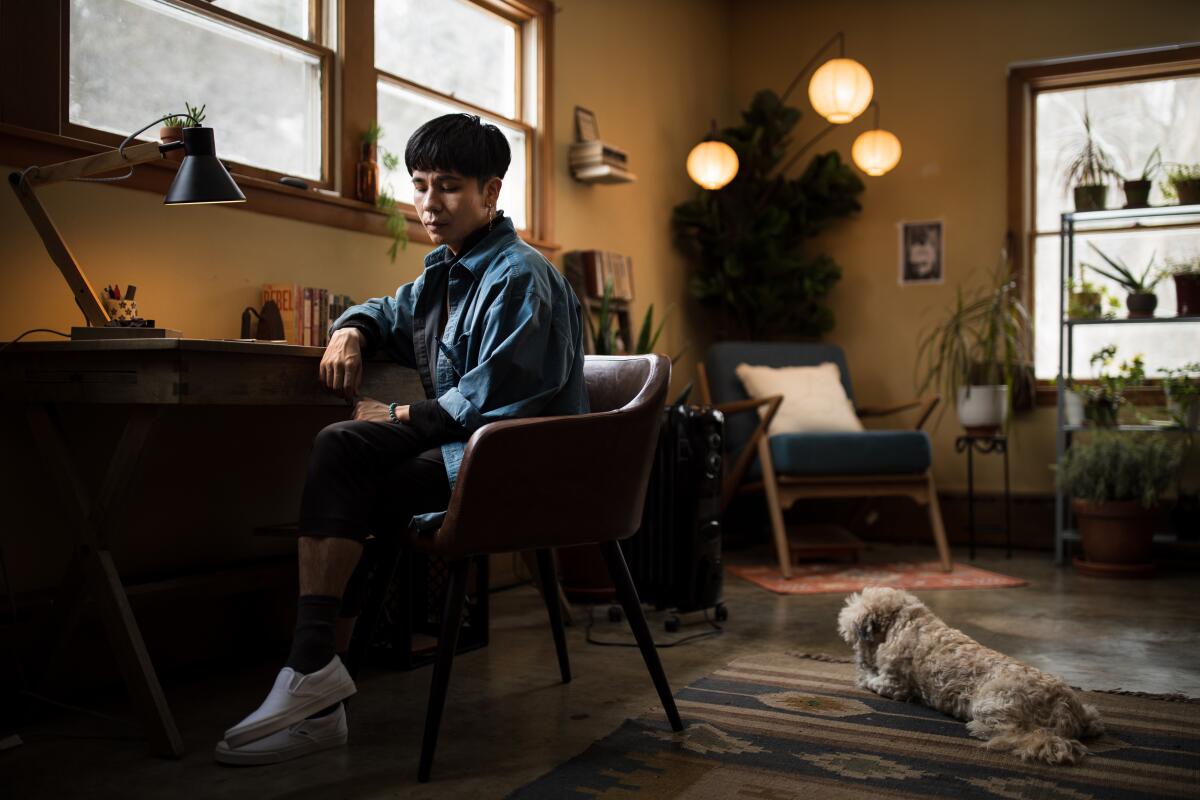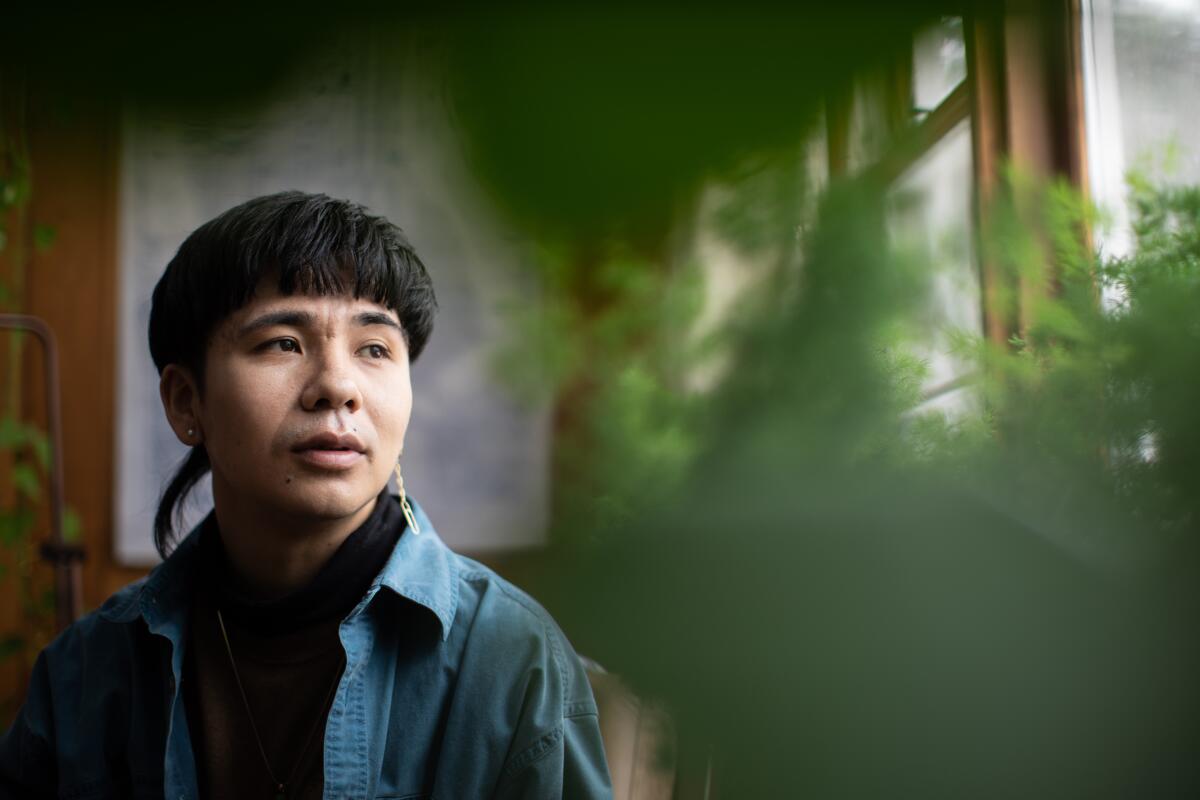When everything changed: Novelist Ocean Vuong reflects on a year of intense highs and lows

- Share via
By his own account, 2019 was a “roller-coaster” year for poet and fiction writer Ocean Vuong. In June he published his debut novel, “On Earth We’re Briefly Gorgeous” to rapturous reviews, and it became an instant bestseller.
In September, Vuong received a MacArthur Foundation “genius” grant, freeing him from financial worries, at least for the next five years. Less than six weeks later, his mother, Rose, died at age 51, not long after being diagnosed with Stage 4 breast cancer.
Vuong said in an interview that his mother’s death was “a huge rupture,” one from which he is still healing. But he feels grateful his mother, who worked in a nail salon for 25 years, was able to see and enjoy his success as a writer.
“She ultimately lived a very good life in the last decade, and I was able to do that and help her, and not many people get to do that,” he says. “I feel very blessed that my mother got to witness the fruits of her labor.”
Vuong, who was born on a Vietnamese rice farm and came to this country as a refugee at age 2, burst onto the literary scene in 2016 with “Night Sky With Exit Wounds.” His collection of poems won him comparisons to Emily Dickinson and some of the poetry world’s highest honors, including the $50,000 Whiting Award.
“On Earth We’re Briefly Gorgeous” is a novel told in the form of a letter from the protagonist to a mother who barely speaks English and will never read it. The novel, which takes its title from one of Vuong’s poems, meditates on themes of whiteness, masculinity, violence and America’s tortured relationship with Vietnam.
Vuong will join the Los Angeles Times Book Club on Jan. 27 for a conversation with Times reporter Carolina Miranda at the Montalbán Theatre in Hollywood. Reviewer Steph Cha described his novel as a “a book of sustained beauty and lyricism, earnest and relentless, a series of high notes that trembles exquisitely almost without break.”
The book blurs the lines between fiction and memoir, and between poetry and prose. The book is lyrical, elliptical, epigrammatic. An entire chapter near the book’s center is a prose poem in memory of the protagonist’s lover, an outpouring of emotion reminiscent of Allen Ginsberg, one of Vuong’s heroes.
Vuong said he is equally comfortable writing poetry or prose, which he describes as two different “conductors of energy.” “I’m more interested in propelling the same energy through the different types of conductors and seeing what gets transmitted,” he says.
Vuong is prone to saying things like this. At 31, he’s a deeply literary writer, an associate professor at the University of Massachusetts at Amherst and a student of the American canon who counts James Baldwin, Toni Morrison, William Faulkner and John Ashbery among his influences.
He grew up in a working-class neighborhood of Hartford, Conn., raised by his mother, grandmother and an aunt. Vuong did not learn to read until he was 11.
Somewhat surprisingly, he cites Herman Melville’s 1851 classic “Moby-Dick” as an inspiration for his novel, both for its experimental form and for its meditations on whiteness, masculinity and American Manifest Destiny. “‘On Earth’ is as much about whiteness as about being Vietnamese American,” Vuong says.
He points to the character of Trevor, the dirt-poor grandson of a Connecticut tobacco farmer with whom the narrator, known only as Little Dog, has a sexual relationship. “I wanted this book to really take a hard look at what white masculinity lives as, particularly in working-class New England milieus,” Vuong says. “Growing up in New England, going to school here, I got a close look at how destructive the deeply rooted toxicity around masculinity was to these men and boys around me.”
The violence of war is a central motif in the novel, touching all its main characters, mainly through the lasting generational impact of the Vietnam War, which the narrator’s mother and grandmother both survived. A searing chapter early in the book describes a scene of brutality against a macaque monkey that plays out as Little Dog’s grandmother and mother face the rifles of soldiers at a tense checkpoint, “a gate made of concertina and weaponized permission,” as Vuong puts it.
“I’m not interested in a story about good and evil around that war. Lord knows that any time you lose 4 million-plus people and 60,000 American soldiers, nobody wins,” Vuong says. “I was interested in detecting the legacy of human violence, and the nonsensical, absurdist rationale around it.”

Vuong, a Zen Buddhist who describes himself as a vegan and pacifist, said the scene also reflects those parts of his identity, and he bristles against being pigeonholed as a “tour guide” to his communities.
“Many critics would say this is an immigrant story and a gay story, maybe something about working class. But a writer is so much more than that. … No wonder we would bomb children, because we are a species that would torture an animal like that.”
In the novel as in life, the Vietnamese and American experiences are inextricably intertwined by years of war and their aftermath. Vuong’s grandfather was an American serviceman, and the author frequently reflects on the strange dynamic that produced him, a Vietnamese American poet, out of the violence of war. “The interesting and tense relationship I have with the war is that without it, I wouldn’t be here,” he said in an interview with PBS. “The truth of what it means to be an American is to be involved in this.”
Vuong said he is looking forward to returning to Los Angeles, where he found an enthusiastic audience for his book during a summer visit to Skylight Books — and a culture far different from where he grew up in Hartford. “On Earth We’re Briefly Gorgeous” moved to the No. 1 fiction spot on the Los Angeles Times Bestseller List last week; it has been on the list for 28 weeks.
“It’s not uncommon for an Asian American child to be just sort of in a nook in New England, alone until they go to college, and to be the only body of color in any given room. In L.A. there’s more of a strong foothold in Asian identity. It was so refreshing to see it lived so easily, so freely for people to congregate, to see faces like my own.”
The past few months have been marked by the intense highs and lows of the MacArthur Foundation award and then the death of his mother.
The MacArthur fellowship, worth $625,000 over five years, came as a shock when the foundation contacted him on a pretense and then put him on speakerphone with the board. While Vuong has found success as a writer and a teacher, he said the money would help him support members of his extended family, who have occasionally come to him for help with emergency expenses. “What this means is that every emergency is prerequisitely taken care of,” he says. “And that is the greatest gift for any writer, to work without fear or anxiety.”
His mother’s death in November has been hard to deal with. “Grief is a world of its own,” he says. “It’s a country, really, and I’m a new immigrant inside it, and like any other country you have to learn the laws, the rules, the physics, and it’s a learning curve. So, there’s good days and bad days.”
Wolk is a writer and editor who enjoys contemporary fiction and memoirs. He has been a senior correspondent for Reuters and NBC News, among other publications.
If You Go: Book Club
The Los Angeles Times Book Club welcomes author Ocean Vuong in conversation with Times reporter Carolina Miranda.
When: 7:30 p.m. Jan. 27
Where: The Montalbán Theater, 1615 Vine St., Los Angeles
Info: Get tickets.
Ocean Vuong at a glance
Born: In Saigon, Vietnam, 1988. Came to the U.S. with his family at age 2.
Lives: Near Northhampton, Mass.
Education: After studying at a community college and briefly at Pace University in New York, Vuong got a bachelor’s in English literature from Brooklyn College, and an MFA in poetry from New York University.
Professional: Associate professor of English at University of Massachusetts, Amherst
Books: “Night Sky With Exit Wounds” (2016), a collection of poetry; “On Earth We’re Briefly Gorgeous” (2019), a novel.
Awards and honors: Whiting Award for poetry, T.S. Eliot Prize for Poetry, New England Book Award for Fiction, MacArthur Foundation grant.
Instagram: instagram.com/ocean_vuong
Tumblr: oceanvuong.tumblr.com
More to Read
Sign up for our Book Club newsletter
Get the latest news, events and more from the Los Angeles Times Book Club, and help us get L.A. reading and talking.
You may occasionally receive promotional content from the Los Angeles Times.










